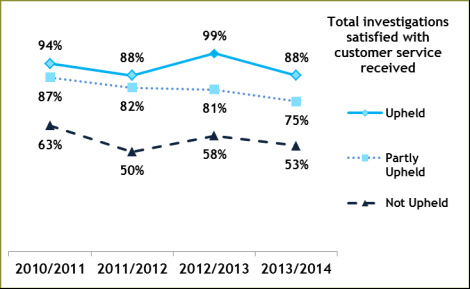New data published today has revealed that since April this year the Parliamentary and Health Service Ombudsman has upheld hundreds more complaints than in previous years.
So far this year, the Ombudsman Service has completed 2,532 investigations about the NHS in England and UK government departments and their agencies. It upheld complaints in 960 of these investigations. In the same period last year (April to November 2013) it completed 867 investigations and upheld 344 cases.
As a result of listening and learning from people's experience of its service, and better understanding of what people expect, the Ombudsman Service has embarked on a radical modernisation drive.
Parliamentary and Health Service Ombudsman Julie Mellor said:
We have made important changes to our service including giving more people justice by doing thousands of investigations every year and halving the average time it takes to complete a case, whilst maintaining satisfaction with our service and decisions. We are on a journey and will continue to listen and be open and transparent about the changes we are making.
Feedback from independent customer satisfaction surveys, stakeholder feedback, Freedom of Information Act requests, complaints about its decisions, a workshop with the pressure group PHSO The Facts and discussions with long standing complainants has shown that sometimes the Ombudsman Service can be slow, bureaucratic, lack transparency and does not always communicate clearly with people.
Following this feedback the changes it has been making include:
- More investigations. So far this year the service has completed 2,532 investigations. In the full year 2013-14 it investigated 2,199 complaints, up from 384 the year before.
- Quicker investigations. It completed 99% of cases in 12 months, halving the average time to complete a case from 432 to 223 days. Customers no longer have to go through detailed assessments before investigations begin.
- Use discretion more positively to investigate serious health cases brought to the service outside the normal 12 month period specified in law.
- More consistent use of face to face interviews for serious cases.
- Hundreds of examples of casework decisions published to show people that complaining can make a difference and to give people the confidence to complain.
- Performance statistics published online on a monthly basis, which show the number of enquiries received, the number of on-going investigations and the number of completed investigations.
- Launching an on-line complaint form next month.
- It is standardising its service and methods, so that people can get a consistent service. This will include:
- Better communication with complaints from the beginning - being clear and upfront with complainants about what they can expect from an investigation, what its role is and what that means the service can and cannot do.
- Developing its method to move to agreeing key facts with the parties concerned. This speeds up the investigation and means there are no surprises when draft reports are issued.
- Sharing investigation methodology at the start of investigations.
- Giving complainants more regular updates on the progress of their case.
Parliamentary and Health Service Ombudsman Julie Mellor added:
If someone has a poor experience of our service it really matters to us and that's why our focus is on listening and learning so we provide an even better service to the 27,000 people whose complaints we deal with every year.
The first phase of the modernisation drive focused on delivering what people told the Ombudsman Service they wanted - more investigations.
The Ombudsman Service is now moving to the next phase of its modernisation agenda and will be carrying out a comprehensive listening exercise to develop a Service Charter - a set of promises to service users, so the public and service providers know what they can expect from the service.
The Ombudsman Service is the final tier of the complaints system and its job is to make formal and final adjudications on complaints. As with other Ombudsman Services there will be times when people are disappointed with its decision not to uphold a complaint or when it is unable to investigate. That's why it is so important for it to be open and transparent about the way it does things and the basis for its decisions, so people are able to get closure and move on with their lives.
Customer satisfaction figures, published today by the Ombudsman Service, reveals that there is a strong relationship between customer satisfaction and whether or not a case is upheld. For example, 88% of customers whose complaints were fully upheld were satisfied with the Ombudsman Service. In contrast, customer satisfaction where complaints were not upheld was 53%.
Its customer satisfaction levels are comparable with other ombudsman services. In 2012-13, the Financial Ombudsman Service found that 90% of their customers who felt they had 'won' their complaint gave positive feedback on the service they had received. In contrast, 48% of those who said they had 'lost' their complaint gave positive feedback.
Because the Ombudsman Service is taking on many more investigations than before, the proportion of investigations upheld has inevitably declined, from 86% in 2012-13 to 39% in 2013-14. This is in line with the uphold rates of other ombudsman services.
As part of its commitment to be transparent about the progress it is making in transforming its service the Ombudsman Service has published an independent report following a workshop with PHSO the Facts, a pressure group, alongside customer satisfaction figures for 2013-14 and this month's performance figures.
Notes to editors
The link to the Ombudsman's Service performance data is here.
PHSO customer satisfaction data from independent research company IFF
Contact: Marina Soteriou
Phone: 0300 061 4996

